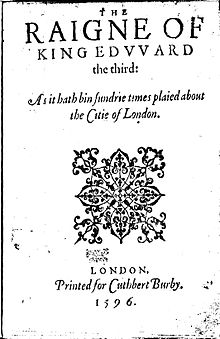Edward III (play)
| Edward III | |
|---|---|

Title page of the first quarto (1596)
|
|
| Written by | possibly: William Shakespeare, Thomas Kyd |
| Date premiered | c.1592 |
| Original language | English |
| Subject | King Edward III experiences personal and military struggles |
| Genre | history play |
| Setting | Fourteenth century: England and France |
The Raigne of King Edward the Third, commonly shortened to Edward III, is an Elizabethan play printed anonymously in 1596. It has frequently been claimed that it was at least partly written by William Shakespeare, a view that Shakespeare scholars have increasingly endorsed. The rest of the play was probably written by Thomas Kyd.
The play contains several gibes at Scotland and the Scottish people, which has led some critics to think that it is the work that incited George Nicolson, Queen Elizabeth's agent in Edinburgh, to protest against the portrayal of Scots on the London stage in a 1598 letter to William Cecil, Lord Burghley. This could explain why the play was not included in the First Folio of Shakespeare's works, which was published after the Scottish King James had succeeded to the English throne in 1603.
The English
Supporters of the English
The French
Supporters of the French
The Scots
King Edward III is informed by The Count of Artois that he, Edward, was the true heir to the previous king of France. A French ambassador arrives to insist that Edward do homage to the new French king for his lands in Guyenne. Edward defies him, insisting he will invade to enforce his rights. A messenger arrives to say that the Scots are besieging a castle in the north of England. Edward decides to deal with this problem first. The castle is being held by the beautiful Countess of Salisbury, the wife of the Earl of Salisbury. As Edward's army arrives, the rampaging Scots flee. Edward immediately falls for the Countess, and proceeds to woo her for himself. She rebuffs him, but he persists. In an attempted bluff, the Countess vows to take the life of her husband if Edward will take the life of his wife. However, when she sees that Edward finds the plan morally acceptable, she ultimately threatens to take her own life if he does not stop his pursuit. Finally, Edward expresses great shame, admits his fault and acquiesces. He dedicates himself to use his energies to pursue his rights and duties as king.
...
Wikipedia
